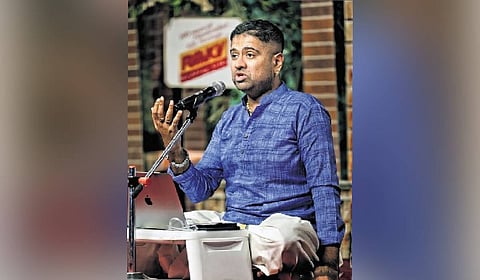The divide in Carnatic music balancing tradition, bhakti and modernity in Margazhi 2024
CHENNAI: Our ancestors had the vision to set aside Margazhi month to reflect on and progress in our inward journey that will develop and grow our existential intelligence. Margazhi 2024, however, has been sensational and melodramatic, making more noise than silence ever since the announcement of the Music Academy’s award to the leading Carnatic musician, TM Krishna.
Definitely, TM Krishna, must be credited for drawing new audiences to Carnatic tradition from diverse backgrounds and age groups. However, his large fan following are uninitiated when it comes to practising any Indic tradition. They are therefore angry with the already initiated Carnatic audience, who question and condemn Krishna’s motives on social media. This has created a divide among Carnatic rasikas.
Noticing the divide, without getting to the bottom of what Carnatic music stands for, some portions of the media have also portrayed TMK to be a champion of social change, labelling the other practicing musicians belonging to the Brahmin community for being “conservative”.
In the meantime, some sabha organisers felt the need to retain the focus of Margazhi to bhakti, the principle sentiment of Indian art, traditions and culture that ensures the inward journey. They began to advertise their Margazhi schedules as a gesture of offering in an effort to kindle the sentiment among rasikas.
However, some young and upcoming Carnatic musicians read the gesture as propaganda, withdrawing at the last minute from the concert. Did the decision come from a compulsion of wanting to be accepted as ‘secular’? If so, then what is their professional obligation to the organiser?
It is thus clear that not only are the rasikas divided, the entire ecosystem, as a whole, is confused. Hence, for understanding the essence of Carnatic music, we will explore bhakti. How should bhakti be understood and approached? Is this the sentiment that is causing the divide in the society?
Dushyanth Sridhar, a highly regarded scholar, Harikatha exponent and a practitioner of a parallel tradition, clarifies about bhakti saying, “Ramanuja acharya, who is hailed as the icon of equality, has stated, ‘bhaktisca jnana visesah’, which means bhakti is the key to acquiring wisdom through directly experiencing knowledge.
To put it simply, bhakti is devotion, but to scale it up, it is devotion for realising an abstraction: that may be either known or unknown. So, between the 6th and 16th Century CE, bhakti, as a sentiment, emerged from Tamil Nadu and swept across the Vindhyas. While in TN it was the alvars and nayanmars, up North, it was the saints and poets Meerabai, Namdev, Tukaram to name a few.
They were all common people of the society belonging to various classes, professions and castes who expressed the experiences of their abstraction through poetries. In TN, bhakti poems were sung as musical compositions in varied formats — araiyars (sing praise of Vishnu), odhuvars (sing praise of Siva) in temples are only a few. The musical compositions of the trinity that are considered holy grail for Carnatic are also soaked in bhakti.”
But is bhakti even relevant now especially since we are living in urban cities; our lifestyle is not like that of our grandparents’; and, since we don’t practice a hereditary profession anymore. He said, “If bhakti had become irrelevant, then the temples must be empty; however, the number of people visiting temples and going for pilgrims have only increased. Why temples! Attendance at my own discourses has seen an increase. Everyone wants to experience — hear and see the divine. The need to experience the divine is that of the atma. This existential search for indescribable experience is inherent and even inevitable.” Indeed!
We attend a music concert because we want to listen to soulful music by a person who can take us closer to divinity. Doesn’t TMK do that? Undoubtedly, he has mastered the craft of Carnatic music. So, why are the hardcore Carnatic rasikas condemning and resisting him?
Dushyanth says, “Music inherently has the ability of rhythm, melody and harmony, that can transport any rasika, but appreciation for a traditional music like Carnatic involves adhering to certain frameworks akin to tradition. One critical aspect of the Carnatic framework is the lyrics. Carnatic music being a child of the bhakti movement, there is an emphasis on bhakti poems that praise Hindu Gods.” That explains why the connoisseurs of Carnatic music are constantly upset with TMK for even choosing poetries of Perumal Murugan.
Surely, they are deep, meaningful and even thought-provoking, but do they suit the measures of classicism that gives Carnatic tradition its unique identity? Also, bhakti poets described Nature and God through idealism; whereas, Murugan’s poems dwell in realism. When a classical tradition like Carnatic is constructed for realising an ideal, should it be reduced or altered just to accommodate someone’s social agenda?
Dushyanth also contrasted Carnatic and Hindustani music to show how Carnatic is heavily based on lyrics. “The beauty of Carnatic music is that it can accommodate bhakti poetries of various Indian languages. This quality makes Carnatic universal, defining its unique identity of classicism. Whereas, Hindustani music, that was developed under the Mughals, chose deliberately to stay only with the sentiments of love between lovers, keeping away from the sentiments of what a bhakta feels for a certain God.”
Clearly, two different classical traditions co-existed for more than four centuries, and true connoisseurs of music for centuries have enjoyed both the classical traditions as they offered different experiences. What we need to ask to appreciate Carnatic is, if the essence of Carnatic is to be changed just to make it secular, will it still be Carnatic then? Does a boiled egg and omelette taste the same?
Art is truly democratic and merit based; and the fate of a practitioner is decided by the rasikas. Fame and name for an artist is a prized possession only if and when the connoisseurs of the art are satisfied.

